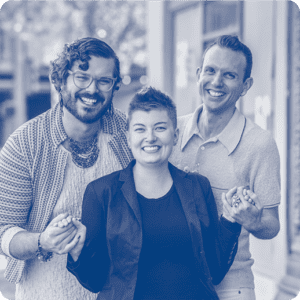LGBTQ+ and mental health
Identifying as lesbian, gay, bi-sexual, transgender or queer does not inherently increase someone’s risk for mental health concerns or thoughts of suicide. However, these individuals may experience stress from being treated unfairly or not being accepted by family, friends, or society that can negatively impact their mental health.
 Mental health matters for everyone, but LGBTQ+ people often face extra challenges. LGBTQ+ stands for lesbian, gay, bisexual, transgender, and queer/questioning. Many in the LGBTQ+ community deal with stress from unfair treatment or not being accepted by others.
Mental health matters for everyone, but LGBTQ+ people often face extra challenges. LGBTQ+ stands for lesbian, gay, bisexual, transgender, and queer/questioning. Many in the LGBTQ+ community deal with stress from unfair treatment or not being accepted by others.
These experiences can lead to problems like anxiety, depression or thoughts of self-harm. LGBTQ+ youth are especially at risk because they may feel alone or misunderstood. Support and acceptance can make a big difference in their lives.
Mental health outcomes for youth
In a 2023 survey done by The Trevor Project (2), nearly 1 in 3 LGBTQ young people said their mental health was poor most of the time or always due to anti-LGBTQ policies and legislation. Nearly half of transgender and non-binary youth report seriously considering attempting suicide in the last year; 41% of LGBTQ young people reported the same.
Among LGBTQ young people, 81% wanted mental health care, according to The Trevor Project report. But 56% of LGBTQ young people who wanted mental health care in the past year were not able to get it. Reasons included being afraid to talk about mental health conditions with someone, not wanting to get parent/caregiver permission and a fear they wouldn’t be taken seriously.
Protective factors
LGBTQ+ individuals report lower rates of attempting suicide when they have access to affirming spaces. This is true for adults and youth. The most commonly place for LGBTQ+ young people to find support is online (68%), followed by school (54%) and home (38%)(2).
You can help support LGBTQ+ youth and adults in many ways.
Learn about LGBTQ+ issues and mental health warning signs:
- Understand LGBTQ+ identities, experiences, and challenges.
- Educate yourself on the warning signs of mental illness.
Listen actively and with compassion:
- Communicate openly and listen without judgment to their experiences, feelings, and concerns.
- Let them know they are heard, supported, and that you’re there for them unconditionally.
- Reflect on your own assumptions and biases.
Respect their identity:
- Affirm their choices and respect their gender pronouns.
- Support them in living authentically.
Help create a safe and accepting environment:
- Foster an atmosphere of acceptance, love, and support in your family or social circle.
- Educate and inform others to promote understanding.
Support access to mental health resources:
- Connect them with LGBTQ+ supportive networks, social groups, or mentors.
- If signs of distress are present, offer help and guidance.
- Help them access LGBTQ+-friendly mental health resources.
If you or someone you know is struggling, help is always available. Our counselors are available 24/7 to provide a listening ear, help keep callers safe, and more. Organizations like The Trevor Project provide additional support specifically for LGBTQ individuals.
In Cedar Rapids, the LGBTQ+ Youth Center provides a “safe and confidential environment for LGBTQ+ youth, families and allies.” Programs include support groups, mentoring programs, art offerings, health initiative classes and more. Learn more on their website.
Everyone deserves love, respect and understanding. Together, we can create a world where LGBTQ+ people feel supported and safe to be themselves.
Sources
(1) https://thriveworks.com/blog/mental-health-and-illness-statistics-lgbtq/
(2) https://www.thetrevorproject.org/survey-2023/
